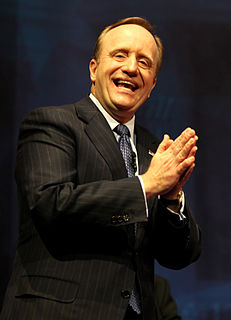A Quote by Paul Romer
For a nation, the choices that determine whether income doubles in one generation or two dwarf all other economic policy concerns.
Related Quotes
The major economic policy challenges facing the nation today - pick your favorites among the usual suspects of low public and household savings, concerns about educational quality and achievement, high and rising income inequality, the large imbalances between our social insurance commitments and resources - are not about monetary policy.
Potential home buyers have a two-step decision process. First, they determine whether they can afford to make a purchase - does their income safely cover their mortgage payment? Then they determine whether owning is a better financial choice than renting - are the costs of owning a home lower than the cost of renting it?
Whether you're a populist; whether you're a limited government conservative; whether you're libertarian; whether you're an economic nationalist - we have wide and sometimes divergent opinions. The center core of what we believe, that America is a nation with an economy, not an economy just in some global marketplace with open borders, but we are a nation with a culture and a reason for being.
When two working people decide to marry, their federal income tax is usually increased. As soon as one spouse earns at least 20 percent of a married couple's total income, the couple pays a 'marriage tax.' ... The United States is the only major industrialized nation in the free world in which the tax cost of the second [married] earner's entry into the work force is higher than that of the first. On one hand, our government's social policy is to help working women earn equal salaries to those of men, but on the other we have a tax structure that penalizes them when they do so.
Let's take the nine states that have no income tax and compare them with the nine states with the highest income tax rates in the nation. If you look at the economic metrics over the last decade for both groups, the zero-income-tax-rate states outperform the highest-income-tax-rate states by a fairly sizable amount.
The job facing American voters… in the days and years to come is to determine which hearts, minds and souls command those qualities best suited to unify a country rather than further divide it, to heal the wounds of a nation as opposed to aggravate its injuries, and to secure for the next generation a legacy of choices based on informed awareness rather than one of reactions based on unknowing fear.




































